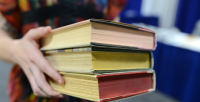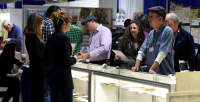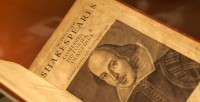The 40th annual Colorado Antiquarian Book Seminar will be held this year July 16 to July 21, at Colorado College in Colorado Springs. Our keynote speaker this year is Kevin Young, the author of ten books of poetry, including Book of Hours, winner of the Lenore Marshall Poetry Prize from the Academy of American Poets and a finalist for the Kingsley Tufts Award; Ardency: A Chronicle of the Amistad Rebels, winner of a 2012 American Book Award; and Jelly Roll: A Blues, a finalist for the National Book Award. He is currently Director of the Schomburg Center for Research in Black Culture at New York Public Library, and was recently named Poetry Editor of the New Yorker magazine. Our specialty dealer this year is ABAA bookseller, Heather O'Donnell, formerly of Bauman Rare Books and now proprietor of Honey & Wax Booksellers in Brooklyn, specializing in literary classics and curiosities, and a past graduate of CABS. More than a dozen scholarships are available this year: please see http://www.bookseminars.com/scholarships.php for more information. Of particular note this year is an addition to the faculty, the consummate collector and political activist, Lisa Baskin. Other returning faculty members include: Terry Belanger, founder of Rare Book School and a 2005 MacArthur Fellow; Brian Cassidy, ABAA bookseller and specialist in most things contemporary; Lorne Bair, ABAA bookseller specializing in labor history and social movements; Maria Lin, Chief, IT and Photography Departments, Rulo... [more 40th Annual Colorado Antiquarian Book Seminar]
This item is still missing as of 6/12/2019. The following item has been reported stolen: Title: A Display of Heraldry Authors: GUILLIM, John (1565-1621). Date of publication: 1610 Publisher: Printed by William Hall, London Description: FIRST EDITION. Folio. Recently respined and recornered, possibly in panelled calf. If you have any information on this item, please contact Adrian Harrington at rare@harringtonbooks.co.uk. [more Stolen: ‘A Display of Heraldry’ (1610)]
The ABAA Benevolent Fund recently received the largest contribution in the fund's history from the estate of Gyngr Schon, who owned Old London Books in Bellingham Washington with her husband Michael Schon. Gyngr Schon became an ABAA member in 2008, after her husband's death, though the Old London Bookshop had been an ABAA member firm since 1994. She had worked as a secretary in her twenties and befriended a rare book librarian at The Huntington, later entering the antiquarian book business with her husband. In 1988, like many other antiquarian booksellers, the Schons began operating their business out of their home — a large, 17-room Victorian in Bellingham. After her husband's death, Schon established a presence on the internet, and through what her colleague Ed Smith describes as “hard work and a positive attitude” kept the business going at a difficult time. Smith recalls the last time he saw Gyngr Schon was at a Book Club of Washington event that “included a stop at Old London Books where Gyngr served refreshments to all and was holding court surrounded by book people who were having fun and laughing and enjoying themselves and buying books from her.” Schon's friend and fellow-ABAA member Taylor Bowie explained the impulse for this bequest: “I recall very well the time I happened to visit Gyngr at her home/shop in Bellingham. No one else was there that day but the two of us, and so she talked very freely. She told me that her will stipulated a large donation t... [more Gyngr Schon Bequest]
This item is still missing as of 6/11/2019. The following item has been reported stolen: Autograph note signed, April 16, 1785, with address panel, to “Monsier Ruston, Hotel d'Orleans, Palais Royal.” “Mr. Jefferson's compliments to Mr. Ruston and begs the honor of his company to dinner on Tuesday next the 19th instant.” If you have any information pertaining to this document, please contact The Raab Collection at 800-977-8333 or nathan@raabcollection.com. [more Stolen: Jefferson Autograph Note]
The following book is missing, presumed stolen, from NY Book Fair, March 13, 2017. STEELE . An Essay upon Gardening, Containing a Catalogue of Exotic Planes for the Stoves and Green-Houses of the British Gardens… York: Printed for Author, By G. Peacock, 1793. 4to (25.7 x 20.1 cm). Description: Later 19th century half calf on pebble maroon paper boards. The front cover is loose, almost off. Raised bands with double gilt lines; gilt title in upper panel; wear to edges. Collation: xxii , , 126, , , 127- 159, , , , 102, , pp. + 3 copper engraved folded plates. The text has some edge dusting and minor toning. Plates and Explanation pages have toning and minor to moderate foxing, plates only. The text block has been trimmed slightly, resulting in absence of plate mark at head and tail of plates. Details of plates is not affected, only blank margin inside plate mark. This is scarce complete copy of one of the first publications with identification of origin of exotic plants growing in stoves, green-houses and British gardens. If you have any information, or believed you have been offered this item, please contact Eugene Vigil (360-354-7512) or vigile@comcast.net. [more Stolen in New York]
“Three columns of unknown verse by the Mad Poet of Broadway: Life is good.” (A brief remembrance of Robert Fraker from Garrett Scott, May 3, 2017.) I probably met Robert Fraker of Savoy Books sometime in the mid-1990s, though later neither of us could ever remember when exactly it happened. It must have been some February back when I worked for John Crichton at the Brick Row Book Shop in San Francisco, when Robert would have been wandering through the shop a day or two before a California Book Fair. This genial bookseller from back east immediately stood out because even when judged by the recondite standards of the Brick Row Book Shop, Robert tended to purchase remarkably obscure titles of American verse. In those days, to have sold anybody a copy of C. L. Woods's Kaw-Wau-Nita, and Other Poems (Stockton, Calif., 1873)—as I believe we did to Robert around that time—seemed to me an event worthy of at least minor celebration; to have sold it to a colleague in the trade, who presumably labored under the belief that he might someday sell it, and at a profit, seemed to my tender sensibilities even more baffling and worth further inquiry. Across the broad landscape of 19th century American poetry, a landscape marked by tall trees like Walt Whitman and Emily Dickinson (or even by the spreading shade trees of Fitz-Greene Halleck and Henry Wadsworth Longfellow, or by the tough native shrubbery of Frederick Goddard Tuckerman or even Jones Very), what kind of bookseller would in... [more In Memoriam: Robert Fraker]
A look at some of the items currently offered by ABAA members can present a partial, but nonetheless illuminating, history of various editors' attempts to complete, "improve," or make Shakespeare more accessible over the centuries. For a guy who's been dead for 400 years, Shakespeare gets more press than many movie stars. Every week there's another theory about what he looked like or whether he was high while writing his plays. This week, the headlines are driven by British designer Jamie Rector, who created a series of new conceptual covers for several plays by Shakespeare, attempting to summarize the plays in a series of emojis. Although this was a concept design, the images caught the eye of Creative Review magazine, who are now using them for a series of posters aimed at attracting new design talent -- evidence that Shakespeare's work still remains vital today. London daily paper Metro speculated that if Shakespeare were alive today “chances are he would have been writing his plays in emoji.” I'm not sure if I can agree with that statement -- not least because Shakespeare wrote for the stage, not the smartphone screen -- but adapting Shakespeare for modern audiences is hardly a new idea. Nicholas Rowe got the ball rolling with his critical editions in 1709. While later scholarly editors sought to gloss obscure words and add historical context, Rowe, a poet himself (and evidently not devoid of ego) tried to improve and modernize the text. Alexander Pope took a similar ... [more Editing Shakespeare]
These items are still missing as of 6/11/19. The following items have been reported stolen: "Comitatus Hollandia", Blaeu, 1608 (ref. Schilder VI, 70) "Comitatus Hollandia" Pieter vanden Keere, 1610 (ref. Schilder VI, 71) "Novus XVII Inferioris Germaniae Provinciarum Typus" Blaeu, 1608, 2nd state (ref. Schilder VI, 52) Cornelis van Dalen, Portret van Maurits von Siegen, engraved portrait (Hollstein 137) Lambert Visscher, Portret van Johan de Wit, engraved portrait (Hollstein 31, 2nd state, before the addition of Cornelis de Witt) F.B. van Berkenrode, "Huys te Honsholredyk", engraved view (Hollstein 16) If you have any information on these items please contact Peter Everaers at secundus@zeelandnet.nl. [more Stolen Maps and Engravings]

Belle da Costa Greene Scholarship offers Tuition-plus for Underrepresented Peoples to CABS
By Susan BenneBelle da Costa Greene Scholarship With the goal of actively working to achieve a more diverse and inclusive community of booksellers and librarians, thanks to the generosity of Lisa Unger Baskin, The Colorado Antiquarian Book Seminars (CABS) is pleased to offer a 2017 scholarship for $2,000 to cover the cost of tuition, room and board ($1,646) with the additional $354 intended for travel or incidental expenses. The scholarship is intended for a bookseller or a librarian from an historically underrepresented community. We encourage applications from booksellers and librarians from the African American, Latino/a/x, Asian American/Pacific Islander, LGBTQ+, working class, persons with disabilities, or other self-identified communities of booksellers or librarians who might benefit from this scholarship. Applicants should submit a short 1- or 2-page essay on why they want to attend CABS. They should include in the statement a brief personal and professional history, and something about their relationship to books and the book trade. We also ask for a CV and one letter of support from a member of the book trade, a professional librarian, or another member of the antiquarian book world. This scholarship is named for Belle da Costa Greene, the African-American librarian, bibliographer, and director of the Morgan Library. The deadline to submit your application is May 1, 2017. We will notify the winner by or before May 15, 2017. Submit your application by mail or by email to Garrett S... [more Belle da Costa Greene Scholarship offers Tuition-plus for Underrepresented Peoples to CABS]
Millions of people who have joined, or watched, the recent protests across the country, beginning with the March for Women, have been struck by the diversity of signs in the crowd. Princess Leia as political crusader, puns riffing on the latest social media meme, diagrams of ovaries, statements of solidarity with Muslim refugees – all have been present, in endless variety. Surprisingly, perhaps, it was not always so. Many libraries and museums collect historical protest signs, and the study of these signs reveals many changes over the years — not only in the issues directly addressed by the signs themselves, but in evolving styles of communication, and the influence of the broader cultural environment. It might seem surprising that some libraries, committed to the preservation of literature and the written word, also collect protest signs. If the effort of prose is to persuade, then such signs (as well as pin-back buttons and bumper stickers) are the epitome of concise communication. The simplest signs simply state an opinion, while others make more of an effort to change the reader's mind, to use a turn of phrase to catch attention (and converts). And some signs – often those that reveal the most about their society – make more complex use of text and image, playing the part of a hand-held, sturdier version of a propaganda poster. We could trace the origins of hand-carried political signs to the Roman era if not earlier, but for the purposes of this blog we will exam... [more Protest Signs: Barometers of Social Change]






